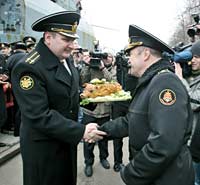| Tell a friend | Print version |
|---|
Russian escort ship Neustrashimy back to base
The Russian escort ship Neustrashimy returned to its base in Baltiysk last Sunday after a mission to help fight piracy in the Gulf of Aden, a first in the modern history of the Russian Navy.
At the base
During the mission, the Neustrashimy visited the Libyan port of Tripoli and twice the Yemeni port of Aden. It escorted 13 convoys with more than 50 ships and rescued the Yemeni boat Line-Xadeda, which had been adrift for four days.
The ship was welcomed at its base by a the families and relatives of the crew, the command of the Baltic Fleet, members of the regional administration, and delegations from Moscow, St.Petersburg, and the Leningrad region.
The commander of the expedition, Captain First Class Oleg Gurinov, reported to Commander of the Baltic Fleet Vice Admiral Viktor Mardusin on the completion of the mission. The commander in turn thanked the crew for a job well done.
“We warmly welcome you back to your native coasts,” the commander told the crew in the welcoming ceremony. “I thank you, crewmembers of the Neustrashimy, for confidently conducting the set task of fighting pirates. I am proud that you accomplished with honor and merit a mission that our ships were no longer conducting. You have become the first. Of course it was not easy. But the crew carried out the set task.

Fleeting instant of joy, long-awaited arrival
The Neustrashimy was forced to use its guns three times during the mission in the Gulf of Eden. According to commander of the mission, Captain First Class Oleg Gurinov, only warning shots were fired, but the encounters were usually serious. For example, on January 1, pirates approached the tanker Elnya escorted by the Neustrashimy. When it became clear that the boat was not a civilian boat but one full of pirates, the crew of the Russian ship fired warning shots. As a result, the pirates, who almost exclusively attack lone ships, quickly retreated. In fact, these pirates of the 21st century have a wide array of arms and modern sailing means.
“They can attack a boat with grenade launchers, or machineguns,” said Gurinov. “Next they try to sail as close as possible to the ships on fast boats at speeds of up to 30 knots. They look like ordinary people, like fishermen. They calmly approach a boat, and then suddenly draw their weapons,” Gurinov added.

The commander of the Baltic Fleet, Vice Admiral Viktor Mardusin, according to tradition, presented the commander of the Neustrashimy, Captain 2nd Class Alexei Apanovich, with a roasted piglet
The Ka-27 helicopter became an invaluable asset in the Gulf of Aden when the ship had to react instantly to the pirate threat.
“Many pirate attacks against civilian cargo ships around the Somali coast were indeed foiled by our helicopter,” Commander of the Air Group Colonel Stanislav Drobysh said. “The ship cannot abandon a convoy when it is leading it. That’s why we helicopter pilots have the responsibility of stopping the attackers,” said Drobysh.
The pirates understood that they had better stay away from the Neustrashimy, according to Drobysh.
“They are very much afraid of us,” he said. “And as soon as they see a helicopter take off, they hide,” Drobysh added.
Regarding rumors alleging that the Neustrashimy was plagued with breakdowns and sick crewmembers during the return trip from the Gulf of Aden, according to the commander of the ship, Captain 2nd Class Alexei Apanovich, the rumors are, to say the least, inventions.
“All crewmembers are in good health,” Apanovich said. “And the ship returned unharmed from its mission. The Neustrashimy itself is preparing for a new mission. We believe the ships of the Russian Navy should be permanently present in that dangerous region of the world,” Apanovich concluded.
Source: Author: Sergei Vasiliev. Photo by Viktor Shelygin. 10.02.09
Translation: RusNavy.com



